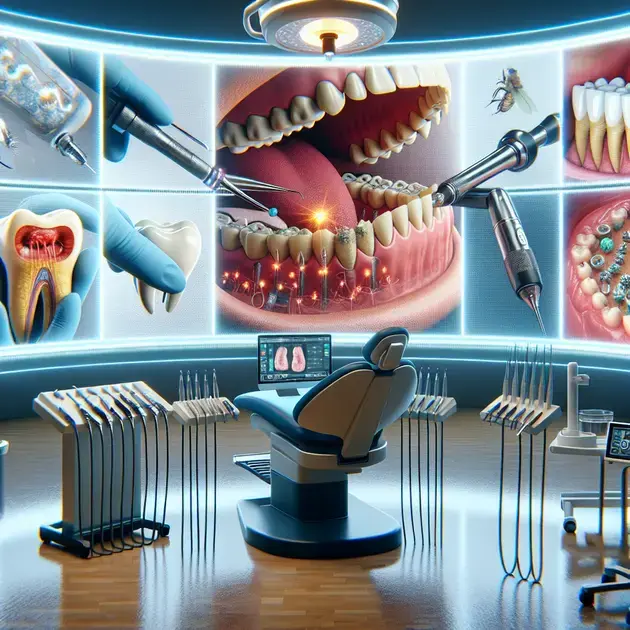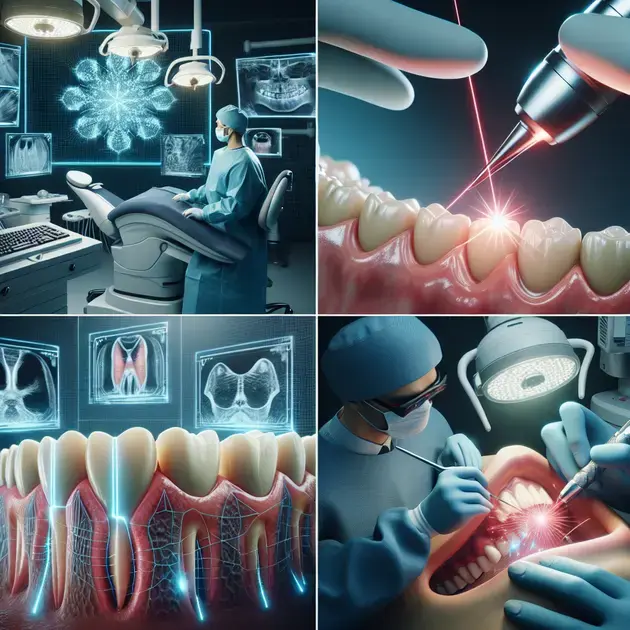Looking for the most effective medication for periodontitis? You’ve come to the right place. In this comprehensive guide, we will explore the latest treatment options and strategies to combat this common dental issue.
Periodontitis, a severe form of gum disease, affects millions of people worldwide. Stay informed and learn about the best practices for managing periodontitis effectively in order to maintain optimal oral health.

Overview of Periodontitis Treatment Options
Periodontitis, also known as gum disease, is a serious oral health condition that can lead to tooth loss if left untreated. The treatment options for periodontitis vary depending on the severity of the disease. Here is an overview of the main treatment options available:
1. Scaling and Root Planing:
One of the most common treatments for periodontitis is scaling and root planing. This procedure involves deep cleaning of the teeth to remove plaque and tartar from the gum line and roots of the teeth. It helps to reduce inflammation and prevent the progression of the disease. You can find more information about this treatment option on the American Dental Association website.
2. Antibiotics:
In some cases, antibiotics may be prescribed to help control the infection and reduce inflammation in the gums. Antibiotics can be taken orally or applied directly to the affected areas. Your dentist will determine the most appropriate antibiotic treatment based on your specific needs. Check out the WebMD website for more details on antibiotic treatments for periodontitis.
3. Surgical Procedures:
For advanced cases of periodontitis, surgical interventions may be necessary to restore gum health and prevent further damage to the teeth and supporting tissues. Surgical procedures such as flap surgery, bone grafting, and tissue regeneration can help to repair the damage caused by periodontitis. To learn more about surgical treatments for periodontitis, visit the Mayo Clinic website.
4. Ongoing Maintenance:
Once you have received treatment for periodontitis, it is important to maintain good oral hygiene habits to prevent the recurrence of the disease. Regular dental check-ups, professional cleanings, and diligent home care are essential for long-term oral health. The Centers for Disease Control and Prevention (CDC) offers valuable information on maintaining oral health after periodontitis treatment.
5. Lifestyle Changes:
In addition to professional treatments, making lifestyle changes such as quitting smoking, improving diet, and managing stress can help to improve gum health and overall well-being. Adopting a healthy lifestyle can complement the effects of periodontitis treatment and reduce the risk of future complications. Explore the Harvard Health website for tips on healthy living for oral health.
Understanding the Causes of Periodontitis
Periodontitis is primarily caused by the accumulation of plaque and tartar on the teeth, leading to inflammation and infection of the gums. However, there are several factors that can contribute to the development of periodontitis. Understanding these causes is essential for prevention and effective management of the disease.
1. Poor Oral Hygiene:
Neglecting proper oral hygiene practices, such as brushing and flossing regularly, can contribute to the buildup of plaque and tartar, increasing the risk of periodontitis. It is important to maintain good oral hygiene habits to prevent gum disease. The National Institute of Dental and Craniofacial Research provides detailed information on oral hygiene practices.
2. Smoking:
Smoking is a significant risk factor for periodontitis as it weakens the immune system and reduces blood flow to the gums, making it harder for the body to fight infections. Quitting smoking is crucial for preventing and managing periodontitis. The American Lung Association offers resources and support for those looking to quit smoking.
3. Hormonal Changes:
Changes in hormone levels, such as during puberty, pregnancy, and menopause, can make gums more sensitive and prone to inflammation, increasing the risk of periodontitis. Understanding the hormonal influences on gum health can help individuals take preventive measures. The Hormone Health Network provides in-depth information on hormonal changes and oral health.
4. Genetic Predisposition:
Some individuals may have a genetic predisposition to developing periodontitis, making them more susceptible to gum disease even with proper oral hygiene practices. Knowing your family history of oral health issues can help you take proactive steps to protect your gums. Genetic testing services like 23andMe can provide insights into your genetic risk factors for periodontitis.
5. Systemic Conditions:
Certain systemic conditions, such as diabetes and cardiovascular disease, are linked to an increased risk of periodontitis. Managing these underlying health conditions can help reduce the likelihood of developing gum disease. Medical websites like Healthline offer comprehensive guides on the connection between systemic health and periodontitis.
Effective Management Strategies for Periodontitis
Managing periodontitis requires a comprehensive approach that combines professional treatments with personalized care and lifestyle adjustments. By implementing effective management strategies, individuals can control the progression of the disease and maintain optimal oral health. Here are some key strategies for managing periodontitis:
1. Regular Dental Visits:
Scheduling regular dental check-ups and cleanings is essential for monitoring the status of periodontitis and addressing any concerns promptly. Dentists can assess the effectiveness of treatments, provide personalized recommendations, and prevent complications associated with gum disease. The American Dental Association emphasizes the importance of regular dental visits for periodontitis management.
2. Personalized Treatment Plans:
Working closely with your dental provider to develop a personalized treatment plan tailored to your specific needs and preferences is crucial for managing periodontitis effectively. Individualized care may include a combination of professional interventions, home care routines, and lifestyle modifications. The Mayo Clinic offers guidelines on creating personalized treatment plans for periodontitis.
3. Supportive Home Care:
Maintaining a consistent and thorough home care routine, including brushing twice a day, flossing daily, and using antimicrobial mouthwash, can help control plaque buildup and prevent the progression of periodontitis. Following your dentist’s recommendations for home care is essential for managing gum disease at home. The Colgate website provides tips on home care for periodontitis patients.
4. Healthy Diet and Lifestyle:
Eating a balanced diet rich in nutrients and limiting sugary and acidic foods can support gum health and overall well-being. Additionally, managing stress, getting regular exercise, and prioritizing sleep can help boost the immune system and reduce inflammation associated with periodontitis. The Academy of Nutrition and Dietetics offers resources on oral health-friendly dietary choices.
5. Ongoing Education and Awareness:
Staying informed about the latest advancements in periodontitis treatment, oral hygiene practices, and lifestyle recommendations is key to effective disease management. By continuously educating yourself and raising awareness about gum disease prevention, you can take proactive steps to protect your oral health. The Centers for Disease Control and Prevention (CDC) provides educational materials on periodontitis awareness and prevention.

**Effective Treatment Approaches for Advanced Periodontitis**
Scaling and Root Planing
Scaling and root planing is a non-surgical procedure performed by a dental professional to remove plaque and tartar from the teeth and gums. This deep cleaning method helps to eliminate bacteria and toxins that cause advanced periodontitis. During scaling, the dentist will use special tools to scrape off the accumulated plaque from the tooth surfaces and below the gumline. Root planing involves smoothing out the tooth roots to prevent bacteria from reattaching. This treatment approach is effective in reducing gum inflammation and promoting healing in advanced periodontitis cases.
Periodontal Surgery
In cases where scaling and root planing are not sufficient, periodontal surgery may be recommended to address advanced periodontitis. This surgical procedure aims to access the roots of the teeth and remove bacteria and plaque from deep pockets in the gums. The dentist may also reshape the bone and gum tissue to promote better healing and prevent further progression of the disease. Periodontal surgery can help to restore oral health and prevent tooth loss in patients with advanced periodontitis.
Antibiotic Therapy
Antibiotic therapy is often used in combination with scaling and root planing or periodontal surgery to effectively treat advanced periodontitis. Antibiotics can help to eliminate stubborn bacteria that cause gum disease and reduce inflammation in the gums. This treatment approach may be prescribed in the form of oral antibiotics, mouth rinses, or topical gels. By targeting the underlying infection, antibiotic therapy can support the healing process and improve the overall outcome of periodontitis treatment.
Laser Therapy
Laser therapy is a modern and innovative approach to treating advanced periodontitis. This minimally invasive procedure uses a dental laser to remove bacteria and infected tissue from the gums. The high-energy light beam cauterizes the gum tissue, promoting faster healing and reducing the risk of infection. Laser therapy is gentle on the gums and results in less discomfort during and after the treatment. This advanced treatment option offers a more precise and targeted approach to managing periodontitis.
Dental Implants
In cases where advanced periodontitis has led to tooth loss, dental implants may be recommended to restore functionality and aesthetics. Dental implants are artificial tooth roots that are surgically placed in the jawbone to support replacement teeth. This treatment approach not only addresses the aesthetic concerns of missing teeth but also helps to prevent further bone loss in the jaw. Dental implants are a long-term solution for patients with advanced periodontitis, providing a stable and durable replacement for natural teeth.
**
Conclusion
**
In conclusion, the treatment approaches for advanced periodontitis offer a range of effective solutions to combat this serious gum disease. Scaling and root planing, as a non-surgical deep cleaning method, play a crucial role in removing plaque and bacteria to reduce inflammation and promote healing. When these methods are not adequate, periodontal surgery steps in to address the disease at a deeper level, reshaping bone and gum tissues for better oral health outcomes.
Moreover, antibiotic therapy, whether in the form of oral medications, mouth rinses, or topical gels, proves to be a valuable addition in targeting bacterial infections and supporting the healing process. Laser therapy introduces a modern and minimally invasive alternative, utilizing advanced technology to remove infected tissue and promote quicker healing with less discomfort.
Lastly, for cases where tooth loss has occurred due to advanced periodontitis, dental implants stand out as a long-term solution. By surgically placing artificial tooth roots in the jawbone, not only do dental implants restore functionality and aesthetics, but they also prevent further bone loss, offering patients a stable and durable replacement option for their natural teeth. By considering these diverse treatment approaches, individuals with advanced periodontitis can find effective ways to manage their condition and improve their overall oral health.



